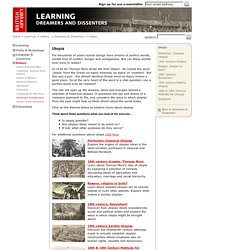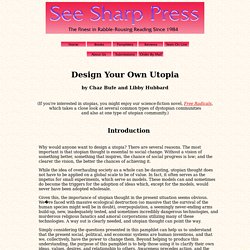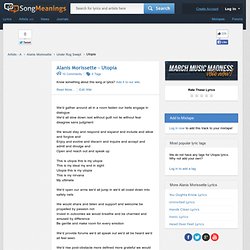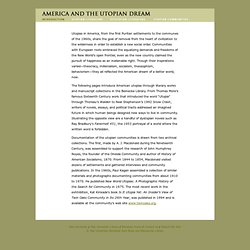

Utopia. For thousands of years human beings have dreamt of perfect worlds, worlds free of conflict, hunger and unhappiness.

But can these worlds ever exist in reality? In 1516 Sir Thomas More wrote the first 'Utopia'. He coined the word 'utopia' from the Greek ou-topos meaning 'no place' or 'nowhere'. But this was a pun - the almost identical Greek word eu-topos means a good place. So at the very heart of the word is a vital question: can a perfect world ever be realised? This site will open up the dreams, ideas and energies behind a selection of historical utopias. Click on the themes below to explore more about utopias. Think about these questions when you look at the sources...
Is utopia possible? For additional questions about utopia click here 16th century dreams: Thomas More Learn about Thomas More's idea of utopia by exploring a selection of extracts discussing ideals of agriculture and education, marriage and social hierarchy. Reason, religion or both? 18th century: Revolution! Design Your Own Utopia. Introduction Why would anyone want to design a utopia?

There are several reasons. The most important is that utopian thought is essential to social change. Without a vision of something better, something that inspires, the chance of social progress is low; and the clearer the vision, the better the chances of achieving it. While the idea of overhauling society as a whole can be daunting, utopian thought does not have to be applied on a global scale to be of value. Given this, the importance of utopian thought in the present situation seems obvious. Simply considering the questions presented in this pamphlet can help us to understand that the present social, political, and economic systems are human inventions, and that we, collectively, have the power to change them.
NOTES: This questionnaire was designed to be of use to both those interested in small, intentional communities and those interested in broad, global transformation. QUESTION ONE -UTOPIA LYRICS. Alanis Morissette - Utopia. Lyrics Utopia Alanis Morissette. We'd gather around all in a room fasten our belts engage in dialogue We'd all slow down rest without guilt not lie without fear disagree sans judgment We would stay and respond and expand and include and allow and forgive and Enjoy and evolve and discern and inquire and accept and admit and divulge and Open and reach out and speak up This is utopia this is my utopia This is my ideal my end in sight Utopia this is my utopia This is my nirvana My ultimate We'd open our arms we'd all jump in we'd all coast down into safety nets We would share and listen and support and welcome be propelled by passion not Invest in outcomes we would breathe and be charmed and amused by difference Be gentle and make room for every emotion We'd provide forums we'd all speak out we'd all be heard we'd all feel seen We'd rise post-obstacle more defined more grateful we would heal be humbled And be unstoppable we'd hold close and let go and know when to do which we'd Release and disarm and stand up and feel safe.

Five For Fighting - World. FIVE FOR FIGHTING LYRICS - World. America /Utopian Dream Intro. Utopias in America, from the first Puritan settlements to the communes of the 1960s, share the goal of removal from the heart of civilization to the wilderness in order to establish a new social order.

Communities with European roots embraced the equalizing demands and freedoms of the New World’s open frontier, even as the new country claimed the pursuit of happiness as an inalienable right. Though their inspirations varied—theocracy, millenialism, socialism, theosophism, behaviorism—they all reflected the American dream of a better world, now. The following pages introduce American utopias through literary works and manuscript collections in the Beinecke Library. From Thomas More’s famous Sixteenth Century work that introduced the word “Utopia” through Thoreau’s Walden to Neal Stephenson’s 1992 Snow Crash, writers of novels, essays, and political tracts addressed an imagined future in which human beings designed new ways to live in community.
Utopian Lit. Utopian Communities.